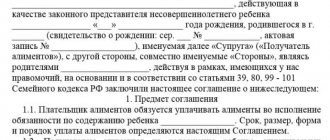The Family Code of the Russian Federation obliges parents to support minor children until they reach adulthood. If parents do not fulfill this obligation voluntarily, then child support may be collected from them in court, which they will pay until they reach adulthood. There are situations in life when parents do not have a real opportunity to pay alimony for their children by court decision, as a result of which they have arrears in child support.
How to reduce alimony debt for a child or for children in court will be discussed in this legal article, taking into account judicial practice.
Reasons for accumulating debt
Various situations may occur in life that lead the payer to accumulate alimony debts. This is important when considering the issue in court and making a decision to reduce the amount of payments.
The reasons for the formation of debt include:
- Intentional deviation from fulfilling obligations. In such cases, the court rarely accommodates the debtor.
- The accounting employee made a mistake when calculating deductions. It is recommended to resolve the issue before going to court.
- There is no financial ability to pay debts, for example, due to losing a job or becoming disabled. These are the most common reasons for filing a claim. We will dwell on them in more detail below.
- The recipient of the money did not inform the payer about the details for transferring funds and hid his position. In such circumstances, the debt arises through no fault of the debtor party.
The likelihood of success in court depends on the reason for accumulating debt. This point must be taken into account before filing a claim.
Why is debt formation dangerous?
Financial support for disabled relatives imposes not only psychological responsibility on the payer. The citizen must monitor the completeness and regularity of payments made independently.
Persons who evade fulfillment of duties in full are subject to punishment in accordance with the legislation of the Russian Federation. Until 2011, the Russian Federation experienced an extremely negative situation with payments for alimony obligations. More than 60% of alimony payers evaded paying funds without having a sufficient reason.
Important! Alimony obligations are a priority when withholding funds from citizens' incomes. If a citizen has several debts, then the requirements for material maintenance are initially satisfied. The remaining debts are paid from the remaining funds.
Involvement in punishment
The Russian government has tightened measures to bring perpetrators to justice. For 2021, the law provides for the following punishment options for non-payers of financial support for disabled relatives:
- fine;
- correctional work;
- arrest;
- compulsory work;
- deprivation of parental rights;
- deprivation of the right to drive a car;
- ban on traveling outside the Russian Federation;
- deprivation of liberty.
Involvement of additional bodies
Control over the timely fulfillment of duties by alimony payers rests with the FSSP. For the complete and timely performance of their duties by bailiffs, they interact with the following authorities:
- credit organizations and banks;
- tax office;
- border control;
- traffic police;
- ATS;
- other organizations.
When performing their duties, FSSP employees can not only involve other bodies, but are also vested with independent powers. For example, drawing up a protocol on an administrative offense or executing a summons.
Why is it recommended to reduce child support debt?
Lawyers recommend not delaying debt repayment and fulfilling the obligation within a short time frame. This is due to the fact that the legislation strictly monitors the observance of children's rights and punishes debtors who refuse to pay. The appearance of debt is fraught with the following consequences:
- Cancellation of a driver's license if a debt exceeds 10 thousand rubles.
- Starting the debtor search process.
- Closing borders and the inability to travel outside of Russia.
- Fine.
- Correctional or forced labor.
- Deprivation of liberty.
In extreme cases, it is possible to be held accountable under the Criminal Code of the Russian Federation. This measure is applied if a person evades obligations and refuses to repay even part of the debt for unpaid years.
The legislation has enough levers to influence the defaulter and force him to pay the debt. This means that it is unlikely that you will be able to get away.
What are the consequences of alimony debt?
The rights of alimony recipients, especially minor children, are carefully protected by law . Therefore, the presence of arrears in payments can threaten the debtor with serious sanctions.
If the writ of execution, that is, the document on the basis of which alimony is collected, is held by the bailiffs, then it is they who must monitor the timely fulfillment of the requirements for payment of funds. The Federal Bailiff Service (FSSP) interacts with various government agencies: tax and border services, State Road Safety Inspectorate, Pension Fund, and so on.
This allows bailiffs to apply the following types of liability to debtors:
- Prohibit them from traveling abroad and limit the validity of their driver’s licenses even if they have a child support debt of over 10 thousand rubles.
- Seize funds (for example, deposits) and property of defaulters.
- Put debtors on the enforcement wanted list.
- Bring them to administrative responsibility, which is expressed in:
- imposition of an administrative fine;
- correctional or forced labor;
- administrative arrest for a period of 10 to 15 days (Article 5.35.1 of the Code of Administrative Offences).
- In case of malicious non-payment, bring the alimony provider to criminal liability under Art. 157 of the Criminal Code of the Russian Federation.
In addition, the recipient of alimony can bring the debtor to civil liability and collect from him a penalty in the amount of 0.1% of the amount of debt for each overdue day - in accordance with Art. 115 IC (Family Code) of the Russian Federation. This amount can be reduced or written off only if there are compelling reasons.
To avoid sanctions, it is best for the debtor to repay the required amount as quickly as possible. However, sometimes it happens that non-payment occurs not through the fault of the alimony provider or if he has serious extenuating circumstances. In this case, the amount of debt may be reduced or even canceled completely.
Circumstances that allow you to reduce debt
Reducing debt is only possible if there are real reasons. Valid reasons include:
- An illness due to which a person is forced to stop making child support payments. For example, a person broke his leg and did not go to work for several months, and the available funds are not enough to pay.
- Receiving disability. A positive decision is possible if during the payment period the payer was injured and a certificate of disability was received.
- Lack of opportunity to work and earn money due to force majeure circumstances. The reason may be bankruptcy of the company, fire, flood or other problems at the enterprise where the person is employed.
- Bankruptcy of the payer, which does not allow him to find a job and receive the income necessary to pay off the debt.
The decision on whether the reason is valid is made only by the court after receiving and examining supporting documents. Concessions may be made to a temporary unemployed person, implying a deferment of debt repayment. After completion of the established period, the person is obliged to repay the debt as usual. Otherwise, the debtor may be punished.
Lawyer's answers to questions about reducing alimony debt
Is it possible to reduce debt upon the birth of a second child in a second marriage?
Yes, if the payer provides certificates confirming low income. It should be no more than the subsistence level for each family member. The spouse's earnings are also taken into account.
Is it possible to reduce the debt calculated based on the average salary in the Russian Federation if at that moment I was already officially employed?
Yes. To do this, 2-NDFL certificates for the period of non-payment from the employer are provided to the court.
Does the bailiff have the right to reduce the amount of alimony paid by his decision?
This is possible if alimony is not paid for the maintenance of a minor child. In other cases, a court decision is required.
How to find out the amount of alimony debt
Before going to court, it is important to clarify the amount to be paid. Information can be obtained as follows:
- The bailiffs who are handling the case. You must have your passport with you.
- Through the official website of the FSSP.
The latter case is more convenient and allows you to obtain additional information - the number of enforcement proceedings, documentation details, bailiff details (telephone, full name), etc. If you have such information on hand, it is easier to calculate the state duty.
How to file a claim for alimony reduction?
A claim for reduction of alimony is drawn up according to the general rules established by procedural legislation and must contain:
- the name of the court where the claim will be filed;
- information about the plaintiff who is filing a claim in court, namely, full name, residence address, telephone number, email. mail if available;
- information about the defendant, also full name, address of residence, if the telephone number is known;
- indication of the price of the claim, i.e. the amount of alimony to which the plaintiff asks to reduce it;
- after indicating the above information, name your procedural document “statement of claim”;
- in the text of the claim, state the circumstances that served as the basis for going to court, namely, when and in connection with what alimony was collected from you, on the basis of what judicial act, what has changed in your life circumstances, because of which you are going to court for reduction of alimony, for example, marital or financial situation. It is also advisable to refer to legal norms regarding issues of reducing alimony;
- In the pleading part of the claim, clearly indicate your requirements, i.e. what you are asking, namely, to reduce alimony to a certain amount or amount;
- when justifying your claims, you will refer to certain circumstances, confirmed by relevant documents, copies of which must be attached to the claim and listed in the appendix of the claim, i.e. After the stated requirements, it is necessary to indicate a list of copies of documents that are attached to the claim. Do not forget to attach the original receipt of payment of the state fee;
- At the end of the application there is a date, the plaintiff’s signature and a transcript of the signature.
The claim, with the attached documents, must be filed with the court according to the number of persons indicated in it, i.e. if the plaintiff and defendant are indicated, then in 2 copies. Don't forget to make one copy for yourself.
ATTENTION: if the form of the claim is not followed, it will be left without movement, giving the plaintiff a period to eliminate the comments. If the deficiencies are not eliminated on time, the claim will be returned to the plaintiff, watch the video with additional tips
How to write off debt peacefully
The easiest way is to resolve the issue with the recipient of funds about reducing financial obligations. The RF IC (Article 114) states that if there is an agreement between the parties, alimony debts can be written off (part or the entire amount). To secure the decision, it is necessary to formalize an agreement. The document is drawn up in free form, indicating the following data:
- information about the payer and recipient of alimony;
- Name;
- reasons for writing off the debt (must be valid);
- the amount of debt that is planned to be written off;
- payment resumption date;
- day of registration and signature of the parties.
To draw up a document, you can contact any notary, regardless of territorial affiliation.
It is worth considering that a voluntary resolution of the issue is possible only after the child reaches the age of majority. If he is under 18 years of age, this route does not apply.
How to reduce penalties for non-payment of alimony
The alimony collector has the right to collect from the debtor a penalty in the amount of 0.1% for each day of delay in payments.
Until August 2021, the penalty amount was 0.5% for each day of delay, as a result of which the amounts of penalties were often disproportionately large. Since the penalty has decreased by 5 times, the amounts to be collected have also become much smaller, but their amount can still be reduced in the magistrate’s court.
To reduce the amount of penalties, it is important that the debtor has valid circumstances for non-payment. According to para. 2 hours 2 tbsp. 115 of the RF IC, the judge may exempt the alimony provider from paying the penalty if it is too high: that is, it does not correspond to the amount of damage caused by the formation of the debt. In this case, the financial and marital status of the alimony payer must be taken into account.
It also follows that the court can, but is not obligated to, reduce the penalty, so the alimony payer must prove the need to reduce the amount. For this he will need:
- certificates confirming low income;
- certificates confirming that the debtor is retired or has received a disability;
- documents confirming the presence of dependents: disabled parents, a pregnant spouse or a spouse on maternity leave, a disabled child, and so on;
- extracts from the medical history and other documents confirming the difficult life situation of the alimony payer.
In particularly difficult situations, the court may even cancel the penalty for alimony.
Going to court
In the event of a deterioration in financial condition, the birth of a second child, or in other difficult situations, the debtor tries to write off part of the debt for alimony payments through the court. This is the only way to resolve the issue if the common son or daughter is not yet 18 years old.
When filing a claim, decide on your ultimate goal. There are two options here:
- Reduce the amount of debt for a certain period. The main condition is confirmation of valid reasons.
- 100% debt write-off. This path is possible if the payer was in no way able to fulfill the obligations.
It will not be possible to reduce or completely cancel the debt if the person was simply idle and did not work for a certain period.
Filing a claim
The outcome of the proceedings largely depends on the correctness of the claim and the documents that are submitted with it for consideration. When filling out an application, you must rely on the Code of Civil Procedure of the Russian Federation (Article 131). Here are the general requirements for completing an application for consideration by a judicial authority.
The document conventionally consists of three elements - a “header”, an explanation and a summary part.
The header states:
- the name and address of the judicial authority where the claim is filed;
- Full name, contact information and address of the parties (defendant and plaintiff).
The explanatory part should contain the following information:
- when, who and why made the decision to assign alimony;
- data on payments: schedule, amount, information about the child;
- information on alimony payments: reasons for calculation, amount and other information;
- an explanation of the reasons why the debt needs to be reduced or written off;
- demand to the court (debt reduction, write-off).
In the final part you must indicate:
- list of documents that are attached to the statement of claim;
- signature;
- the day the claim is filed and submitted to the judicial authority.
It is important to understand that no one will give a 100% guarantee that alimony debts will be written off or reduced. It depends on many circumstances. If the judge thinks that there are insufficient grounds for writing off, he may reduce the amount of the debt or even refuse the plaintiff.
Required documents
An equally important issue is the collection of documentation that is attached to the claim. This includes the following copies:
- passport;
- birth certificate (if the child is under 14 years old);
- documents on divorce;
- a decision made earlier by the court to collect alimony;
- contacting FSSP employees regarding the issue of debt;
- resolution from the FSSP on the calculation of the amount to be paid;
- confirmation of decreased income and insolvency.
After receiving the papers, the court considers the case within one month from the date of filing the claim. Both parties are invited to participate in the meetings, but the law allows the case to be considered without one of the participants. After receiving the decision, the plaintiff has the right to formalize the resolution with a higher authority.
Procedure for reducing the amount of debt
To reduce the amount of debt, the payer must do the following:
- File a statement of claim and go to court. The case is being considered within the framework of civil procedural legislation.
- Receive notification with the date of the first meeting. It is sent by the secretary to all parties to the paperwork. The defendant is the recipient of alimony, and a copy of the claim is sent to him.
- Come to the meeting. It examines the evidence presented and examines the parties' arguments. If the defendant does not object to the reduction of the debt, the case can be considered in one day.
- Receive a court decision after it comes into force. A writ of execution (IL) is attached to it.
- Submit the IL to the bailiff who initiated the proceedings. If this is not done, he will not be able to cancel the debt, and it will continue to accrue.
The payer can go to court at any time. Release from debt or reduction in its amount is carried out only by court decision.
Jurisdiction
The claim is filed in the magistrate's court at the place of registration of the plaintiff or defendant.
When a court decision does not suit one of the parties, it is possible:
- appeal before entry into legal force in the appellate procedure;
- decisions that have entered into force are appealed by filing a cassation appeal.
An appeal or cassation is filed with the court that made the contested decision. After a series of procedural steps, the complaint is automatically sent to a higher authority. The decision is canceled on the basis of an appeal or cassation ruling.
How to file a claim?
A claim to reduce the amount of debt consists of an address part, a title and a main part. A unified form is not established by law.
To fill it out correctly, you can use the following example:
To the Magistrate's Court of Belgorod, st. Michurina, 57
Plaintiff: Mamatov O. N.
Address: Belgorod, st. August 5, 39, apt. 65
Defendant: Afanasenko L.D.
Address: Belgorod, st. Pervomaiskaya, 11, apt. 37
Statement of claim
On the basis of writ of execution No. 347684, I am obliged to pay alimony in the amount of 1/4 of my monthly earnings for the maintenance of Mamatov’s minor son K.O.
At the time of collecting alimony, I had an official place of work, my salary was 20,000 rubles. 5,000 rubles were paid per child monthly. In addition to the above deductions, I regularly bought clothes and toys for my son, made gifts, and purchased food. I did not maintain a relationship with my ex-wife.
In May 2021, there was a reduction in the company where I was employed, and as a result I was fired. I tried to find a job, but I couldn't find a job. Considering my age - 50 years old - there were refusals from all the organizations I applied to.
Due to the lack of a place of work, I have accumulated a debt in the amount of 105,053 rubles. according to the decision of the bailiff Makarenko O.V.
In October 2021, I faced another difficult life situation: my house burned down. I was injured in a fire and was in the hospital for 3 weeks, then I was released for outpatient treatment. Now I live with my mother. Guided by the norms of Art. 114 IC RF,
Ask:
Release me from paying arrears of alimony in the amount of 105,053 rubles. Documents confirming the existence of valid reasons are attached to the application.
12/20/2018Signature of the claimant
The value of the claim should be understood as the amount from which the debtor requests exemption. According to paragraph 6 of Art. 91 of the Code of Civil Procedure of the Russian Federation, when calculating the price, it is necessary to take into account the amount by which the payment is reduced, but not more than 12 months.
Documentation
To successfully consider a claim, the court must be provided with documentary evidence depending on the situation:
| Hospital stay | Medical certificates indicating the duration of treatment |
| The appearance of a second child | Birth certificate of the child, salary certificates of all family members |
| Receiving disability, serious illness | Certificate of disability from ITU, information from medical institutions |
| Dismissal | Work record book, copy of dismissal order due to reduction |
| Fire and other natural disasters | Conclusion of the commission. For example, in case of a fire in a house, you will need an act from the State Fire Inspectorate |
Terms and procedure for consideration
The claim is considered in the following order:
- The judge has 5 days to initiate proceedings.
- Once a determination of proceedings has been made, notices are sent to the plaintiff and the defendant.
- The maximum period for consideration in the magistrate's court is 1 month from the date of acceptance of the claim for record keeping (Article 154 of the Code of Civil Procedure of the Russian Federation).
State duty and other expenses
According to paragraph 3 of Art. 333.19 of the Tax Code of the Russian Federation, claims for reduction of alimony debt are related to property claims that are not subject to assessment. The state duty will be 300 rubles.
Other expenses may include attorney fees. The cost of specialist services is set by legal organizations and can be a percentage of the amount of the claim or a fixed amount. Everything is paid for by the plaintiff himself.
Is it possible not to pay a debt if the child is already 18?
Many people believe that the obligation to pay child support debts applies only to adult children. This is a misconception. According to the RF IC, the mother and father are obliged to support the child only until the age of 18, but provided that there are no financial obligations.
If one of the parents owes a certain amount, the debts are not written off upon reaching adulthood. The only difference is that new amounts no longer accrue.
Cancellation of accumulated debt is available in only two ways - by drawing up an agreement or through the court. How to do this correctly has already been mentioned above.
Is it possible to reduce the penalty on debt?
Art. 114 of the RF IC allows you to receive exemption not only from the main debt, but also from the penalty. When resolving issues, you should be guided by the Resolution of the Constitutional Court of the Russian Federation dated October 6, 2017 No. 23-P, which states that this is allowed if the amount of the penalty is disproportionate to the consequences of non-payment and in the presence of extenuating circumstances.
To reduce the amount of the penalty, you need to act in the same manner as to reduce the principal debt - through the court.
Drawing up an application
The claim must contain a detailed description of the circumstances giving grounds for reducing the penalty. When filling it out, it is recommended to use the following example:
Statement of claim to reduce the amount of the penalty
According to writ of execution No. 57769, I am obliged to pay alimony for the maintenance of my minor son Volokitin L.I., born in 2015.
I am in a difficult financial situation. I have no opportunity to find a job due to disability after an accident; I am currently undergoing treatment. My wife supports me, and she is dependent on our two other children.
Considering my position and the fact that I consider the amount of the penalty to be disproportionate to the damage incurred by non-payment,
Free me from paying arrears and alimony penalties. Documents confirming valid reasons are attached to the application.
01/11/2018 Signature of the applicant
Is it possible to reduce or not pay the penalty?
If the alimony payer does not fulfill his obligations for a long time, a penalty is charged on the accumulated amount. Its size is 0.1% of the debt for each day of stitching. The longer a person goes without paying their bills, the faster the total amount grows. After repayment of the penalty, the debtor retains the obligation to pay the principal part of the debt.
Exemption or reduction of the penalty is possible only if the amount is clearly exaggerated and incommensurate with the consequences for the recipient. In this case, the court takes into account the situation in the family. For example, if there is a second marriage and children in it, the judge can meet halfway and knock off part of the debt.
Let us note that reducing or canceling the penalty is the right, but not the obligation, of the representatives of Themis. To receive a suitable decision, the applicant must confirm that he is not to blame for the accumulation of penalties and non-payment of funds. The following documents may be submitted as evidence:
- Certificate with information about low earnings.
- Papers confirming the presence of other children, a pregnant wife, old parents, a child with a disability, etc.
- Documents confirming high utility bills.
- Certificate of disability.
- An extract from a medical institution with information about the disease.
The more compelling evidence the debtor provides, the higher the chance of writing off the penalty accrued on alimony debts.
Grounds for reducing or canceling debt
Alimony obligations are established by agreement between the parties or in court. In the latter case, a writ of execution (IL) is issued, and when the case is considered in writ proceedings, a court order is issued.
In order not to pay a penalty of 0.1% of the amount, debtors try to reduce the amount of debt. Everything can be done if there are grounds provided for in Art. 114 RF IC.
The law states that the parties can reduce the debt by entering into a peace agreement. This is true when payments are intended to support former spouses or parents.
When paying money for the maintenance of a minor, the issue is resolved in court, including by agreement, when the recipient does not object to the reduction of the debt.
When it comes to reducing payments for children, this is possible for valid reasons for non-payment.
According to the Resolution of the Plenum of the Armed Forces of the Russian Federation dated December 26, 20167 No. 56, these include:
- Compulsory military service. When the payer is sent to serve, alimony obligations are not canceled. In such a situation, he can turn to the bailiffs to suspend proceedings for the period of service, and the debt will not accrue. Production resumes upon returning home. Otherwise, a debt is formed, which can be reduced or canceled through the court.
- Treatment in a medical hospital. In such cases, an application for suspension of proceedings is not filed, and debt begins to accumulate. It can be canceled by submitting the relevant certificates.
- Changes in the financial situation of the alimony payer, the emergence of new dependents. When a child is born in a new marriage, the financial situation may worsen, which creates obstacles to repaying the debt. According to the law, no more than 70% of the salary can be withheld in the form of alimony along with debt payments. When there is not enough money, the court, after consideration, has the right to reduce the amount of debt.
- Force majeure circumstances during the period of non-payment. If at this time there were military actions, fires, floods in the payer’s territory, the debt can be reduced.
Each situation is considered by the court individually. The court takes into account documentary evidence of valid reasons and the financial situation of the debtor. In the event of a combination of unfavorable factors, complete cancellation of the debt is possible.
Arbitrage practice
The law of the Russian Federation is aimed at supporting and protecting children, therefore the court, when considering a case, always proceeds from their interests. However, there are many cases of successful completion of cases in favor of the applicants and the writing off of part or all of the debt. Judicial practice shows that when considering a case, in addition to those already mentioned above, other circumstances are taken into account:
- Loss of ability to work of any family member, which places an additional financial burden on the alimony payer.
- Leaving a job due to disability and being unable to earn the same wages.
- The emergence of a new family and child.
If the judge has strong evidence of the payer’s inability to repay the debt, he will reduce or cancel the debt.
Reasons for reducing alimony
- The presence of other minors and (or) disabled adult children with the alimony provider.
For example, Vasily has two children from different mothers. For each child, 25% was withheld from his salary, although by law it should be 33%. Vasily turned to our specialists, they helped him draw up a claim and prepare documents for the court. The court made a positive decision and alimony is now 16% for one instead of 50% for two.
- Having disabled parents in the care.
- Little income.
For example, Yuri lives in St. Petersburg, works as a loader, his salary is 20,000 rubles. For three children, he was charged 10,000 rubles or 50%. The cost of living in the city for the working population is 12,079.5 rubles. It turns out that after paying alimony, his income fell below the subsistence level. Yuri filed a lawsuit that his rights were violated and alimony was reduced.
- Health problems of the alimony payer (long-term rehabilitation after illness, resulting in incapacity for work).
- Disability of the alimony payer (group 1 or 2).
For example, a person himself needs help and special care, which entails additional costs.
- Another child in care has a serious illness requiring long-term treatment or disability.
Results
As can be seen from the article, it is possible to reduce alimony debt. If the child is over 18 years old, the issue can be resolved peacefully, but in other cases the only solution is the court. In this case, the judge may agree if he receives real confirmation of the person’s inability to fulfill his obligations.
If you encounter difficulties with collecting documents or protecting your interests in court, you can always turn to the lawyers of our website for help. Get free advice on all issues and help in resolving disputes.
What should the payer do to reduce the fine?
In order to reduce the penalty for alimony, the payer must act in the same way as the claimant - file a lawsuit to reduce the amount of the penalty. The procedure is as follows:
- The payer draws up an application to reduce the penalty and collects the necessary evidence documenting valid reasons for non-payment.
- The application is sent to the court. The application itself must reflect not only the reason for the alimony penalty, but also decipher how and why it was formed.
- The plaintiff collects all documents confirming his current difficult financial situation or complete insolvency.
If the legal proceedings due to the payment of a penalty were initiated by the recipient of alimony, then the defendant needs to prepare an objection, which will list all the arguments confirming his innocence.
In cases where the verdict on the collection of alimony penalties has already been announced, the defendant has the right to challenge it in the district court, that is, to file an appeal or a reasoned complaint. A decision that has already entered into force can be challenged in a magistrate’s court. This can only be done for objective valid reasons or in the event of force majeure. Moreover, in this case, only the amount of alimony can be reduced, since the penalty for alimony, already collected by a court decision, cannot be reduced.
Judicial procedure for debt reduction
If it was not possible to reduce alimony arrears peacefully, or if such arrears arose in relation to a minor child, then the reduction procedure will have to be carried out through the court.
The consideration of such cases by the courts always follows one specific pattern. To obtain a court decision to reduce alimony debt, the payer must follow the following step-by-step instructions:
- Assess your chances of success. To do this, it is better to consult with specialists, covering the current situation in detail. An experienced lawyer will be able to advise whether it is possible to reduce overdue alimony payments or write them off altogether.
- Find out which judicial department handles such cases.
- Draw up a claim that sets out all the nuances and expresses the request.
- Collect the necessary package of documents; the required completeness can be clarified in court or with a consulting lawyer.
- Submit your completed registration kit and wait to be notified of the day of your scheduled meeting.
Then the applicant will be required to regularly attend all scheduled meetings, as well as collect and provide additional documentation, if necessary during the proceedings.
Rules for drawing up a statement of claim
An experienced lawyer will say that half the success in future judicial proceedings depends on a well-drafted statement of claim. To reduce the amount of alimony debt or write it off completely, you need to file a claim. To write it, you can use the attached sample or take an example of filling it out in court. Or you can contact a law office, where, for a fee, the claim will be drawn up by specialists.
The statement of claim should include the following information:
- Name and address of the court. In some cases, the name of the judge may be indicated, but you can do without it.
- Contact information about the applicant himself. The full name and address where the plaintiff lives and where correspondence can be sent is required. You can also provide a phone number.
- The title of the document, as it were, precedes the beginning of the presentation of basic information.
- The first block is devoted to the introductory part. It must describe when the alimony benefit was assigned - the date of assignment. Indicate the number of the writ of execution according to which they were deducted, the amount of monthly payments.
- The following indicates the moment at which payments stopped.
- A calculation of the debt accumulated on the day of filing the claim is provided.
- The formation of debt is justified. At this point, it is necessary to explain why payments were not received during this period, and what entitles the alimony recipient to claim the opportunity to reduce the debt. The more detailed the circumstances that arise are described, the better.
- To summarize, the applicant expresses a request for full or partial write-off of the debt amount.
- At the end of the document there is a numbered list of those papers that allow you to confirm what is stated in the claim.
The application is signed by the alimony provider personally, the signature is certified by the full name and date of submission.
What documents need to be prepared?
To accept this claim for consideration you will need:
- Applicant's passport. In addition to the original, you will need copies of the first and second pages, as well as those sheets with stamps about registration, marital status and the presence of children.
- A writ of execution or settlement agreement, which describes the amount of alimony benefits that must be paid regularly.
- Papers proving relationship with dependents, or other reasons for paying alimony benefits.
- Further, the list will include documents that will explain the plaintiff’s inability to pay benefits during a certain period. This could be certificates from doctors, a certificate of a disabled person, papers from places of imprisonment confirming imprisonment. It is possible to submit a work book, which will indicate the liquidation of the organization or dismissal due to staff reduction.
- A sheet for calculating the accumulated debt can be obtained from the bailiff.
You can also attach testimony from neighbors, relatives, colleagues, doctors or other persons.
Consideration of a claim in court
The submitted statement of claim is checked for compliance with the standards when it is registered at the court secretariat. If any discrepancies are found, it may not be accepted and may be returned for revision. If the document is registered, then all that remains is to wait for written notification of the time of the first meeting, at which the issue of how to reduce the alimony debt will be considered.
Judicial practice requires the mandatory presence of both parties to the process at the appointed meeting. If one of the parties does not appear, the hearing of the case is postponed.
During the meeting, the judge finds out the details of the case from the alimony payer, he is also interested in the opinion of the second party, the recipient himself. By the way, the alimony recipient can protest the filed claim or simply present serious counterarguments that do not allow the applicant’s demands to be satisfied. Witnesses may be called to court to confirm the words of one or another party.
Based on the results of the court hearing, the judge makes a decision that can be challenged and appealed in the prescribed manner.







